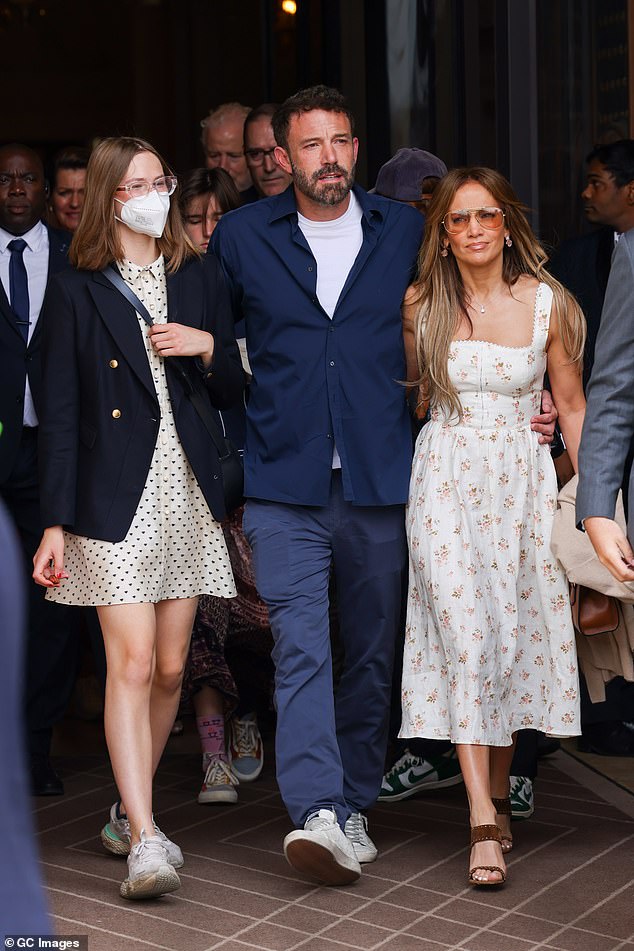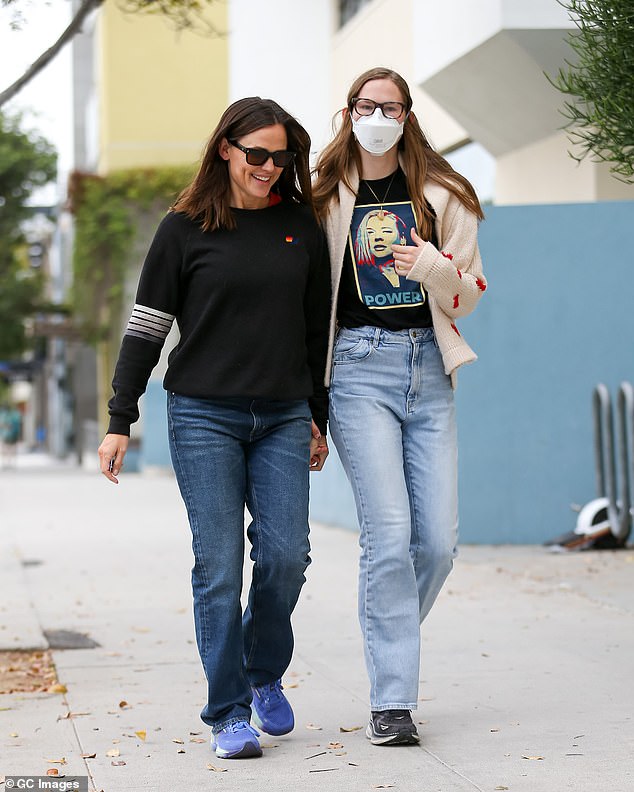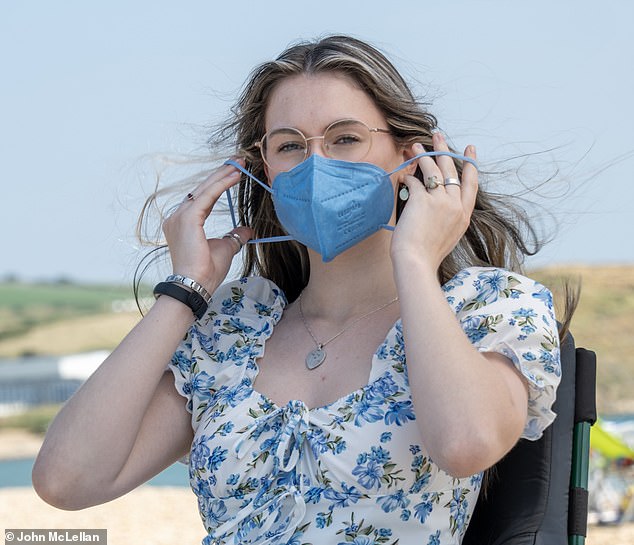For most freshmen, starting college comes with a host of anxieties. But for Kitty McFarland, the fears of leaving home run deeper than simply doing her laundry and balancing coursework with outings.
When the 18-year-old starts school next month, she will be wearing a face mask (the kind we’re all familiar with during the Covid pandemic) at all times.
Kitty has worn one virtually every time she’s left the house since the start of the pandemic in 2020 and doesn’t plan on taking it off anytime soon, despite feeling like it alienates her from her peers.
“I’m worried about being seen as an outcast,” she says. “But sometimes you have to pick your battles.”
Kitty McFarland has worn a mask virtually every time she has left her home since the start of the pandemic in 2020.

Violet Affleck in a mask, with her father, Hollywood star Ben Affleck, and Jennifer Lopez
Kitty says she was bullied for wearing a mask at school, part of the reason she’s so worried about starting college.
“People called me ugly names because I always had my face covered,” she explains. “That created a personality that everyone considered weird, so no one interacted with me. No one even tried to get to know me.”
“Wearing a mask puts you in your own little bubble.”
Kitty chooses to wear a mask because she is battling chronic Covid-19 disease and is worried that contracting the virus again could make it worse.
And she is not alone. Last month, Violet Affleck, the 18-year-old daughter of Hollywood star Ben Affleck, publicly revealed why she wears a mask when she spoke out against plans to ban face masks in California, amid concerns that protesters would use them to hide their identities during pro-Palestine demonstrations.
Violet revealed she has struggled with “a post-viral condition” after falling ill during the pandemic and insisted a ban would make “vulnerable members of our community less safe”.
Her speech divided opinions: some called her “brave” and others described her as “unhinged” and “totally deluded.”
Experts say Kitty and Violet are among a significant number of teenagers for whom life has not moved forward since the pandemic.
Despite doctors warning about the detrimental psychological and emotional impact that wearing masks can have on adolescent development, these young people are still afraid of contracting COVID-19. Some even believe that wearing a mask is their moral duty.
Many people are taking to social media to complain that the COVID-19 mask mandate has ended and lament feeling “abandoned” by their peers. TikTok videos of influencers sharing tips on how to manage anxiety when they are the only ones wearing masks are receiving tens of thousands of views. “Don’t look them in the eye and judge them even more for not wearing a mask,” one advised.
Medical professionals have long used masks to limit the spread of germs in the hospital.
The goal is to prevent infected people from spreading these germs when they exhale, or in turn limit the risk of others inhaling dangerous viruses.
During the pandemic, face masks were adopted as a measure to limit the spread of the coronavirus, including legal regulations requiring them to be worn in public spaces such as supermarkets. For a time, children were also expected to wear masks at school, although those under 11 were exempt.
However, there has since been intense debate over whether masks actually reduced the spread of the virus.
A 2021 study claimed masks helped reduce infections by 50 percent. However, a study earlier this year from the University of East Anglia said they were largely ineffective in countering Covid.
And research has shown that forcing children to wear masks at school had negative effects on their mental and emotional health.
For teens who continued to wear face coverings long after mandates were lifted, this can leave serious psychological scars.
“For young people, it’s really important how others perceive them,” says Dr Stella Chan, a clinical psychologist at the University of Reading and an expert in adolescent depression. “Social relationships play a big role in teenagers’ mental health. So if someone is the only person still wearing a mask, they might feel very self-conscious and ultimately cause psychological stress.”

Jennifer Garner out and about with her daughter Violet Affleck, who is, of course, wearing a face mask
However, Kitty says the social isolation she suffers as a result of her mask is worth it.
In March 2020, she fell ill with Covid-19. After two further bouts, she was diagnosed with long-term Covid-19, a condition that affects around 60,000 children in the UK and can cause extreme fatigue, shortness of breath, mental confusion, palpitations and muscle pain. As a result of these symptoms, she often needs a wheelchair to get around.
He now wears a mask outside his home because he fears that contracting Covid again could make his condition worse.
“Sometimes I wear one for six hours a day,” she explains, “but I know it could prevent me from becoming more disabled than I am now.”
It is a theory that some experts support.
But others believe mask-wearing could be preventing young people from getting through the pandemic.
“When you obsess over a risk, you don’t learn how to manage it effectively,” says Professor Robert Dingwall of Nottingham Trent University.
But Kitty insists that the mask will not be removed until scientists can find a cure for her condition.


